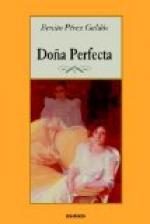=193= 26 =alla se le va=: ‘are about the same as she,’ ’are taking the same line.’
=193= 33 =esto se lo lleva la trampa=: grammatically, =la trampa= is the subject of the clause; =lo=, which repeats =esto=, is the object; =se= is the reflexive of interest, often used with =llevar=.
=194= 22 =en buen hora=: cf. n. on p. 35, l. 26.
=195= 5 =le dan=: cf. n. on p. 38, l. 6.
=195= 11 =sonsonete lloron=: ‘sarcastic whine.’
=195= 25 =si=: cf. n. on p. 40, l. 34.
=196= 8 =tenebrario=: properly a candlestick which is used during matins of the last three days of Holy Week. These matins are called in Spanish =tinieblas=. The light of the =tenebrario= is dimmed by placing it within a kind of shrine. The idea here, of course, is that obscurity is part of the family inheritance.
=197= 18 =acabo de estrujarle=: ‘gave him the last squeeze.’
=198= 3 =suspirando a moco y baba=: ‘sighing and snuffling.’
=198= 15 =en un quitame alla esas pajas=: ‘in a wink of your eye’ (colloq.). The phrase means literally ’get those straws [trifles] out of my way,’ and implies the feeling that a thing can be done quickly and easily.
=198= 27 =los juegos de manos son juegos de villanos=: the Spanish Academy defines this proverb in about the sense given to it by Gase’s French-English Dictionary, “playing with the hands is bad manners, rough play is low”; but the priest here, quite legitimately, makes it mean “physical force is a blackguard’s way.”
=200= 12 =qui tenga visos=: ‘that has the look.’
=200= 27 =Como lo huelan los de tropa=: ’supposing the military get a smell of it.’ For conjugation of =oler= see grammars.
=201= 4 =Guarde usted=: ‘look out for.’
=201= 16 =el salitre=, etc.: i.e. powder.
=202= 6 =Si=: cf. n. on p. 40, l. 34.
=202= 17 =ha perdido la chaveta=: ‘have lost your wits.’ =Chaveta=, or more commonly =chabeta=, is properly a wedge or key used by blacksmiths or carpenters to unite and tie several pieces of metal or wood.
=202= 31 =medio=: adverbial, i.e. to be followed by a hyphen in English. Contrast =media=, adjectival, in the line above.
=203= 2 =Para solfas=, etc.: ’drubbings by treachery are not what Cristobal Ramos is good for.’
=203= 31 =si es empeno de usted=: ‘if it is your particular wish.’
=204= 4 =jofaina=: ‘finger-bowl’ here.
=205= 6 =no tienen espera=: ‘endure no stay.’
=205= 21 =me tiene=: ‘she has for me.’
=208= 13 =quijotadas=: ‘extravagances,’ ‘quixotic undertakings.’ The word is formed from the name of Cervantes’ hero.
=209= 13 =Mi coalicion=, etc.: ’my half-serious, half-jocular coalition.’
=210= 3 =Sentire mucho que=: ‘I shall be very sorry in case.’
=210= 11 =y concluira=: ‘and end it shall,’ or simply ‘and it shall.’




